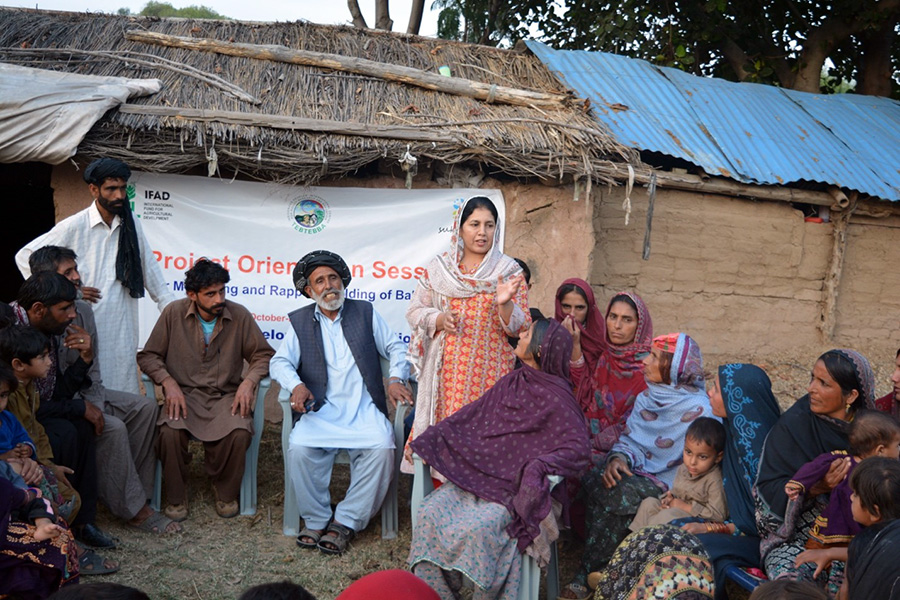On 15 October 2020, Tebtebba’s IPAF Coordinator, Ruby Bangilan-Española, was invited to share about the Indigenous Peoples Assistance Facility (IPAF) in the ongoing Pacific Regional Consultation Workshop (14-16 October 2020) for the Indigenous Peoples’ Forum (IPF) at the International Fund for Agricultural Development (IFAD).
The 2021 global meeting’s theme is “Indigenous People’s Food Systems and Livelihood in the Context of COVID-19,” a currently relevant focus as communities worldwide, including Indigenous Peoples, grapple with the said infectious and deadly disease and its corresponding impacts on food security and livelihood accessibility.
In preparation for the upcoming global meeting of the Indigenous People’s Forum that is to take place in Rome, Italy in February 2021, these consultation workshops are held in Africa, Asia, Latin America and the Caribbean, and the Pacific regions. Participants include “representatives of indigenous peoples’ organizations, institutions and communities; national and regional organizations involved in IFAD-funded projects; IFAD staff; partners of the Indigenous Peoples Assistance Facility (IPAF); members of the UN Permanent Forum on Indigenous Issues (UNPFII); and government representatives.”[1]
These regional events will enable attendees to examine IFAD’s engagement with indigenous peoples’ communities, and exchange experiences as well as share best practices specifically about indigenous food systems and livelihood accessibility which, as mentioned, is this 5th global meeting’s agenda.

Project Orientation and Rapport-Building with the Bakarwal Youth in Pakistan.
Launched under IFAD in 2006, IPAF “aims to strengthen indigenous peoples’ communities and their organizations in Africa, Asia and the Pacific, and Latin America and the Caribbean by financing small projects which foster their self-driven development in the framework of the United Nations Declaration on the Rights of Indigenous Peoples (UNDRIP).”[2]
The IPAF is carried out by means of allowing various indigenous peoples’ organizations worldwide to submit project proposals in relation to the Facility’s main objective, “to build a direct partnership with indigenous peoples to enable them and their communities to design, approve and implement [grassroots] development projects based on their own perspectives.”[3]
Hence, to submit an initiative proposal, any eligible indigenous peoples’ organization must focus on indigenous peoples’ identity, culture, natural resources, and knowledge. Additionally, these projects must be built and executed by indigenous peoples’ communities and their corresponding organizations.
Once a project proposal is submitted to the IFAD through the Facility’s call for proposals phase, submissions are reviewed.
Once an indigenous peoples’ organization’s project proposal is confirmed for funding, it is then granted a fund that may range from $20,000 to $50,000 USD depending on the Facility’s judicious prerogative.
The regular Indigenous Peoples’ Forum (IPF) is a unique process under IFAD that aims to have indigenous peoples’ organizations and institutions, IFAD, and governments in an all-encompassing dialogue. It is an international gathering that takes place every two (2) years wherein recommendations are made in relation to the improvement of relations of indigenous peoples, IFAD, and government, gearing toward indigenous peoples’ active participation in project and policy conceptualization, implementation, monitoring, and evaluation.
“It’s good that Pacific was able to carry out a face-to-face consultation workshop because for Asia, we are still organizing the region’s own consultation workshop but it will have to be in virtual and series form due to the on-going restrictions caused by the pandemic,” Ms. Espanola shares. Various lockdown and social distancing protocols are currently enforced worldwide in a bit to halt the rapid COVID-19 transmission, posing dire challenges to the usual flow of interaction and communication.
----
[1] The Indigenous Peoples Assistance Facility (IPAF), “Summary report from the regional consultation workshops held in Africa, Asia, Latin America and the Caribbean, and the Pacific,” 2019, p.3.
[2] The Indigenous Peoples Assistance Facility (IPAF), “Assessment of the Performance of the Fourth Cycle,” International Fund for Agricultural Development (IFAD), 2019, p.9.
[3] The Indigenous Peoples Assistance Facility (IPAF), “Linking grass-roots indigenous peoples’ organizations and the international community,” 2019, p.4.


